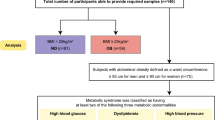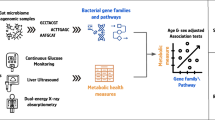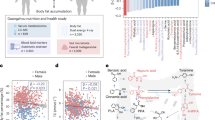Abstract
Emerging evidence that the gut microbiota may contribute in important ways to human health and disease has led us and others to hypothesize that both symbiotic and pathological relationships between gut microbes and their host may by key contributors to obesity and the metabolic complications of obesity. Our “Thrifty Microbiome Hypothesis” posits that gut microbiota play a key role in human energy homeostasis. Specifically, constituents of the gut microbial community may introduce a survival advantage to its host in times of nutrient scarcity, promoting positive energy balance by increasing efficiency of nutrient absorption and improving metabolic efficiency and energy storage. However, in the presence of excess nutrients, fat accretion and obesity may result, and in genetically predisposed individuals, increased fat mass may result in preferential abdominal obesity, ectopic fat deposition (liver, muscle), and metabolic complications of obesity (insulin resistance, hypertension, hyperlipidemia). Furthermore, in the presence of excess nutrients, a pathological transition of the gut microbial community may occur, causing leakage of bacterial products into the intestinal lymphatics and portal circulation, thereby inducing an inflammatory state, further aggravating metabolic syndrome traits and accelerating atherosclerosis. This pathological transition and the extent to which antimicrobial leakage occurs and causes inflammatory and other maladaptive sequelae of obesity may also be influenced by host factors, including genetics. In the proposed study, we will directly test the Thrifty Mirobiome Hypothesis by performing detailed genomic and functional assessment of gut microbial communities in intensively phenotyped and genotyped human subjects before and after intentional manipulation of the gut microbiome. To address this hypothesis, we will enroll three age- and sex-matched groups from the Old Order Amish: (i) 50 obese subjects (BMI > 30 kg/m2) with one or more dysmetabolic manifestations (malignant obesity), (ii) 50 obese subjects (BMI > 30 kg/m2) without any dysmetabolic manifestations (benign obesity), and (iii) 50 nonobese subjects (BMI < 25 kg/m2) without any features of the metabolic syndrome and characterize the architecture of the gut microbiota from the subjects enrolled in this study by high-throughput sequencing of 16S rRNA genes. These studies will provide a deeper understanding of the role of gut microbes in terms of ‘who’s there?’, ‘what are they doing?’, and ‘how are they influencing host energy homeostasis, obesity and its metabolic complications?’
Similar content being viewed by others
Article PDF
Author information
Authors and Affiliations
Corresponding authors
Rights and permissions
About this article
Cite this article
Fraser-Liggett, C., Shuldiner, A. The Thrifty Microbiome: The Role of the Gut Microbiota in Obesity in the Amish. Nat Prec (2010). https://doi.org/10.1038/npre.2010.4957.1
Received:
Accepted:
Published:
DOI: https://doi.org/10.1038/npre.2010.4957.1



